[ad_1]
Creating a cozy and inviting living space is crucial for any apartment, and adding texture is an excellent way to achieve this. Texture brings depth, warmth, and character to a room, creating a visual experience that engages the senses. From using different materials and colors to incorporating handmade objects, artwork, and textiles, there are numerous ways to bring texture into an apartment. Whether you’re renting an apartment in Spokane, WA, or a townhouse in Anaheim, CA, we will explore various ways to bring texture into your apartment, providing inspiration and ideas to create a space that’s perfect for you.
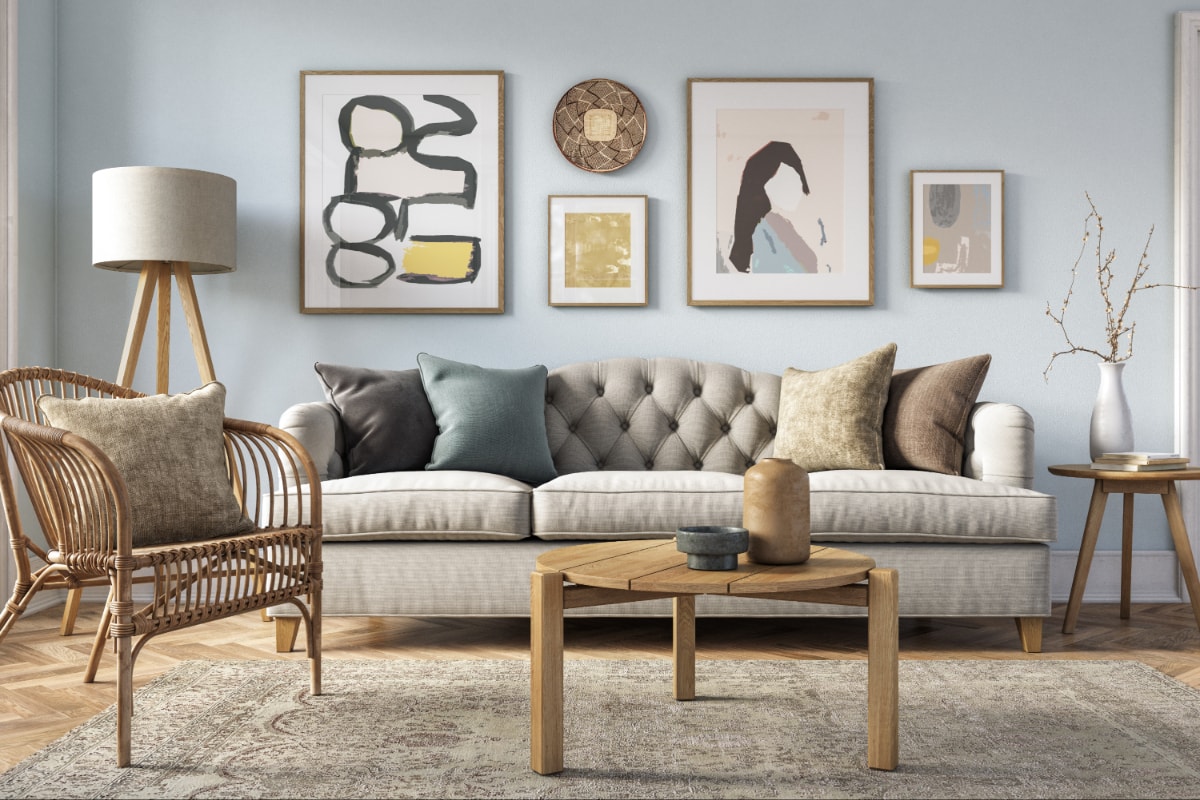
1. Choose large artwork with thick layers of paint or bold brush strokes
Large artwork with thick layers of paint or bold brush strokes can add depth and texture to an apartment’s walls, creating a striking focal point in any room. The interplay of light and shadow on the textured surface of the painting can add visual interest.
“Images with landscape, floral, or ocean themes can make you feel like you are spending more time surrounded by nature,” says San Francisco-based artist Kim Ford Kitz. “Choose certain colors pulled from the artwork to add accent colors around the room with pillows, rugs, or fabrics to tie it all together.”
2. Focus on color and warmth
Focusing on warmth and color creates a welcoming and inviting environment. Using warm tones and colorful accents can also bring depth and richness to the space, making it feel more visually appealing and comfortable.
“Textured, unique, one-of-a-kind works of art add color, warmth, and texture to your apartment. Custom-handmade textured paintings also make a great conversation piece on your walls,” shares Barbara Arnold Art.
3. Bring in texture with yarn
Love Life Yarn remarks, “One great way to add texture to your apartment is through yarn. Crochet wall hangings are wonderful for adding texture, as you can use many different stitch patterns and yarns for interest. Another way is to crochet succulents and use them as decor around the apartment – no green thumb required.”
There are many other ways to bring texture into an apartment through yarn, such as using crocheted or knitted blankets, adding a woven tapestry or macrame wall hanging, or even creating your own textured wall art by wrapping yarn around a canvas or embroidery hoop.
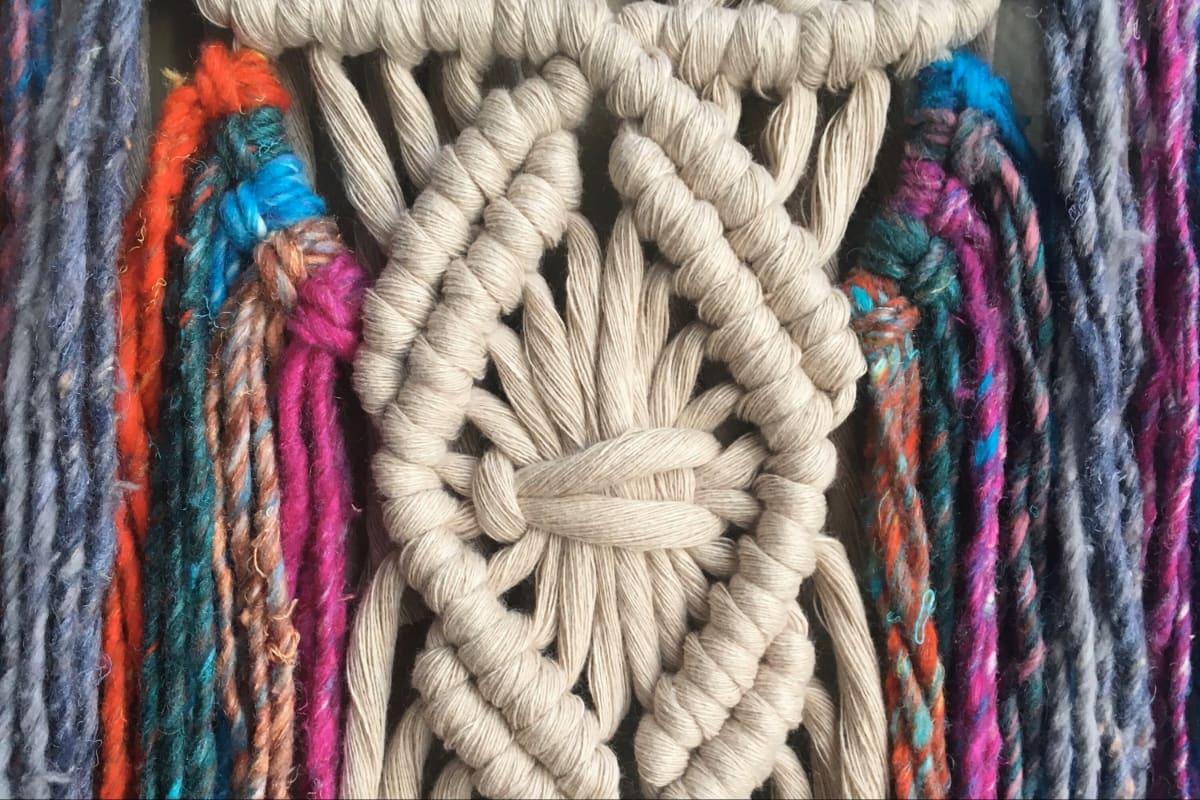
4. Create a wall collage of small art prints
Wall collages can bring texture into a home by incorporating a mix of mediums such as photographs, paintings, prints, and decorative objects.
“A simple and eye-catching way to add texture to your apartment is by creating a wall collage of small art prints. Using different types of frames will create that fresh pop of texture that will excite your guests. Play with color by choosing monochromatic prints, then include a pop of color that complements them,” recommends artist Jeffcoat Art.
5. Select artwork and painting with implied textures
Adding texture through artwork and paintings with implied textures is a great way to bring visual interest to a home. Implied textures, created through techniques such as layering and brush strokes, can add depth and dimension to a piece, creating a tactile experience for the viewer without the need for actual physical texture.
“Create texture in your apartment by selecting paintings or artworks with implied textures,” shares Adam VanHouten Fine Art. “Whether the artist is depicting the roughness of barn wood or the soft feeling of grass beneath your feet. The actual texture of the work may be less important than the feeling of texture the artist has created visually. Select a texture in a painting that stands out from the normal texture of your surroundings.”
6. Use modern and vintages frames for your gallery wall
Using a mix of modern and vintage frames is a great way to bring texture into a home. The contrast between the smooth lines of modern frames and the intricate details of vintage frames creates a visually interesting display, adding depth to walls.
Chicago illustrator Nicole Cicak says, “Create a gallery wall that mixes modern and vintage frames of different sizes and colors. I also love blending matted and non-matted artwork. Varying the way your art is displayed will add interest to your space, giving it a more curated feel.”
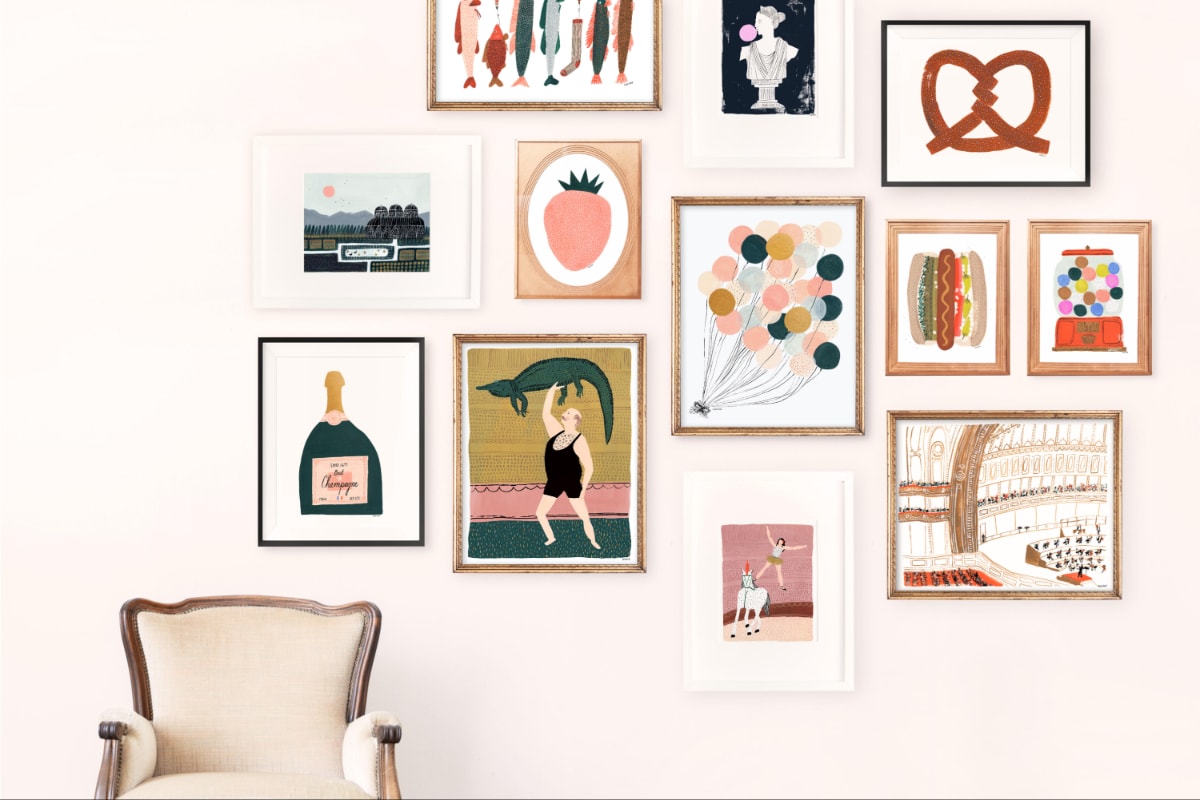
Photo courtesy of Nicole Cicak
7. Layer your pieces
Another way to bring texture into your home through artwork is to layer your pieces. You can layer different materials, colors, and textures, such as throw blankets, pillows, rugs, and curtains.
“Whether it’s artwork layered in front of each other on a painting ledge or adding coordinating pillows and sculptures that tie the color palette of your room together, start with your main art piece and build your accent pieces from there,” shares Dana Mooney Art.
8. Bring in handmade paper, large swathes, and pops of nature
Handmade paper adds a unique texture and organic feel to wall decor, while large swathes of fabric, such as curtains or a tapestry, can add visual interest and softness to a space. Pops of nature, such as plants and natural wood accents, can tie your inside space to your outside space.
“Handmade papers, sourced from a local art supply store, can be framed or tacked to the wall with magnets to add large swathes of texture and color,” notes Janice McDonald Art. “In addition, bring bits of nature inside — an interesting branch in a recycled bottle, shells lined up across a tabletop, beautiful pebbles in a small handcrafted bowl. Express your personality using items that resonate with you in your new home.”
9. Bring in a mix of different materials and colors
Artist Kevin Swallow says, “Adding texture by using a mix of different materials and colors is a great way to add visual interest to any room in your home and set the tone for your space. For example, an oil painting with bright colors, interesting shapes, and thick paint showing the brushstrokes will add interesting texture to any wall. Plus, unique pieces of art by local artists will make your space feel more personal and give you a story to tell your guests as they enjoy your space.”
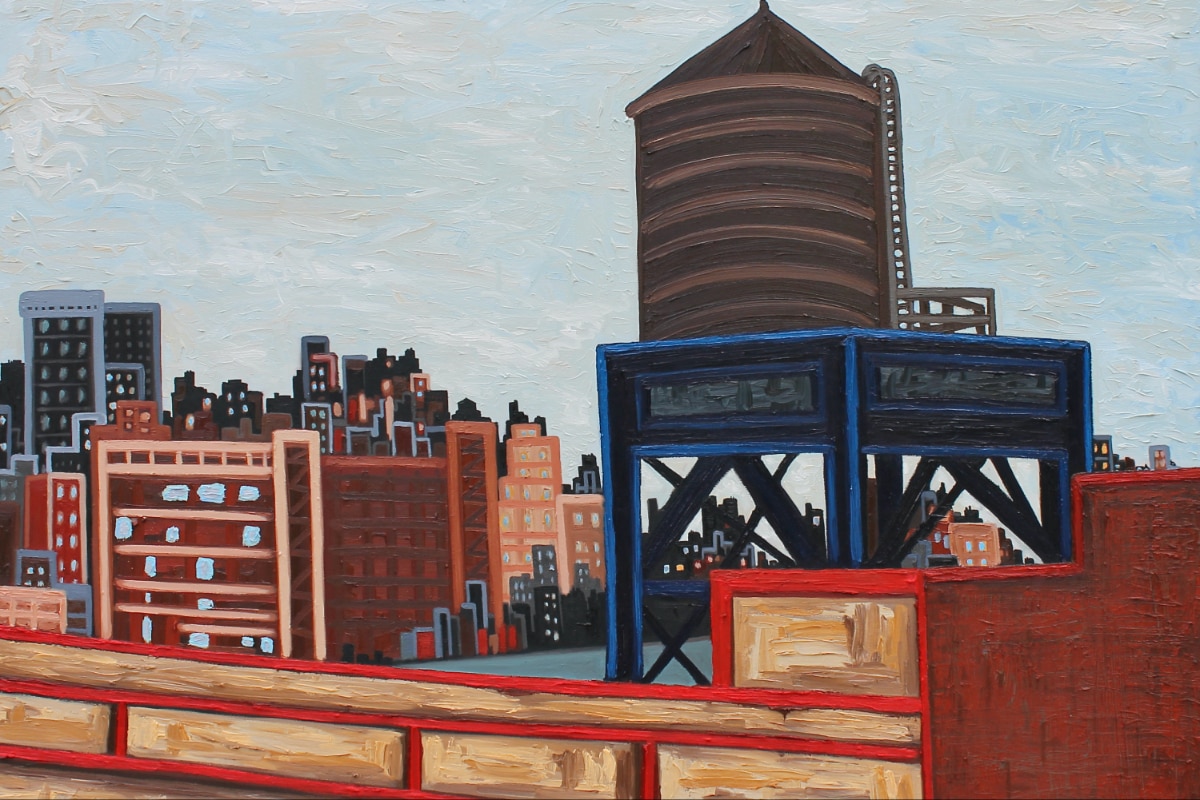
Photo courtesy of Kevin Swallow
10. Think about using original oil paintings
The rich, layered colors of oil paintings can add depth and dimension to a room, making it feel more dynamic.
“One of my favorite ways of bringing texture to any space is hanging an abstract painting with thick impasto built up with warm and cool colors. Not only do you get the feel of the physical paint, but the interplay between the colors adds depth and emotional interest,” shares Monti Sharp of Sharp Art Studio.
Amanda Lee Jones Art Studio adds, “To add texture to your apartment, consider buying original oil paintings from local artists instead of prints or photographs. Original oil paintings can have very beautiful textural surfaces, from more subtle brushwork to heavy impasto.”
11. Install a sculpture
The textures of the sculpture, whether smooth or rough, polished or matte, can add depth to any room.
Sculptures can create dynamic texture through the contrast between objects and the surrounding space,” says Portland-based sculptor Chas Martin. “It draws attention and stimulates curiosity. Placed at the end of a hall, in a quiet corner, or on a bookshelf, a sculpture creates a textural focal point making both the object and its space more interesting.”
Sabah Fine Art adds, “It is interesting how a lot of people and some interior designers are more focused on displaying art on walls, but not on the floors. I find that sculpture and artifacts are a wonderful way to make your space feel inspiring and add more richness and spatial harmony to your home.”
12. Utilize rugs in living areas
The different textures and fibers of a rug, from shaggy to woven, can create a visual contrast against smooth flooring.
PIGSY’s Art notes, “For apartment dwellers, space can be a premium, but there are clever ways to add texture and interest to apartment living areas through art. One way to introduce texture is through the use of rugs. Rugs are traditionally used on floors to dampen sound, but they can also be hung on walls as art pieces to create a focal point with texture.”
He also shares that many rug companies collaborate with artists in order to create special collections of rugs that are highly sought-after, rare, and valuable additions to art collections.
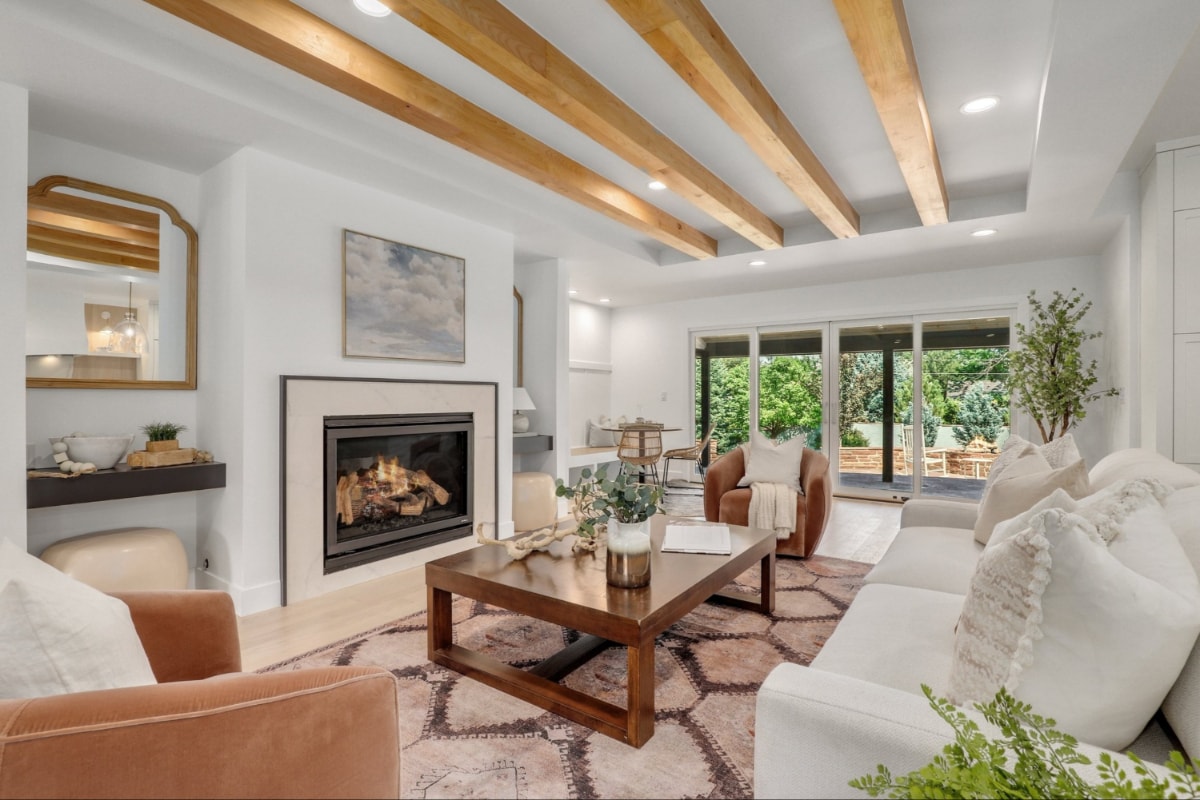
13. Create vignettes out of items that reflect your style
Creating vignettes groups together objects of different shapes, sizes, and textures to create a unique display. By incorporating items such as books, candles, decorative objects, and small plants, you can create a vignette that adds texture to your apartment.
“Create vignettes out of items that reflect your personal style or journey,” shares jewelry designer Corey Egan. “I love pairing items from different chapters of my life, like a painting from my travels with a carved wood family heirloom, and finding the visual connections between them. Sometimes it’s a color story, while other times it could be a complimentary pattern or material. By looking for those aesthetic links, you can find harmony in your grouping, yet each component has deep personal meaning.”
14. Go with neutral furniture, abstract floral, or geometric paintings
Neutral furniture, such as a beige or gray sofa, can provide a backdrop for adding texture to an apartment through accent pillows and throws made from various materials like velvet, wool, or faux fur. Abstract floral or geometric paintings can add texture to a space by incorporating colors and shapes.
“Go with neutral furniture and get a wow factor with a rug high in visual texture. Also, try an abstract, floral, or geometric painting or pillow for a little pizazz. Repetition of similar natural shapes also creates textures complemented by an earthy wooden sculpture. A soft, nubby throw over your favorite chair provides a soothing texture. And a hammered metal finish catches the light and adds interest to a side table by your favorite easy chair,” says Fiona Phillips Art Studio.
15. Decorate your wall with quilts
Decorating with quilts can create a cozy atmosphere while also adding layers of texture to your apartment. Quilts come in various colors, patterns, and fabrics, providing a versatile option to incorporate into any interior design style.
“Whether you’re looking to add texture to your walls through a mini quilt or an art quilt, decorating your table for each season with a quilted table runner or bench pillow, or going big with a new bed quilt, quilting provides something for everyone. And if you don’t like traditional quilts, check out the modern quilt movement. Quilts provide not only texture but a custom homey feel and can decorate any part of your home,” notes quilter Sew Special SA.

Photo courtesy of Sew Special Quilts. Quilt made by Cescily Abbott
16. Use a mix of 2D and 3D art pieces
2D art pieces, such as paintings or prints, can provide a visual texture, while 3D pieces, such as sculptures or woven wall hangings, can add a physical texture that engages the senses and adds depth to the space.
“One tip I have found helpful when decorating an apartment with art is to have a mix of 2D and 3D art pieces throughout your space that feels meaningful to you. By mixing flat and sculptural pieces together, your space can have more depth, texture, and warmth,” shares Mini But Mighty Art. “For me, that means the flower vase by Studio Kaksikko I bought from the MoMa design store to hold my fresh flowers in the kitchen or the jungle green and gold botanical-inspired mural I painted as an accent wall in my bedroom.”
17. Curate a collection of pottery pieces
Using pottery is a great way to bring texture to an apartment because of their unique shapes, colors, and textures. Pottery also provides a tactile experience, making it a versatile option for incorporating texture into various areas of an apartment, such as tabletops, shelves, and walls.
“What’s great about having pottery in an apartment is that it can draw the eyes around a smaller room in unexpected places, and depending on the color, can add dimension by contrasting with the foreground or background,” remarks Frayed and Fragile. “Texture on a candy dish or a vase can add even more interest to a smaller section of your space. Pottery is especially helpful in adding character, a certain mood, or dimension to a space since you are not limited to a wall like a print or painting.”
“To add texture to your space with ceramic work, choose pieces that complement the style of the room. Mix and match smaller pieces to create one appealing display. Hang unique framed ceramic tile as a decorative accent. Use rustic finishes ceramic pot as a statement piece,” recommends ceramicist Clover Lee.
“Adding a handmade pottery piece or collection of pieces with unique textures and glazing is a great way to add a focal point to any room. Hand-carved and embossed pottery are experiencing a surge with pottery artisans worldwide, “adds Lori Langford, Owner Big Dog Pots Pottery.
Lisa York Arts shares that there are many different ways to display pottery. “My favorite kitchen trend is open shelving for displaying your functional pottery collection rather than their being hidden behind kitchen cupboards. I also like to incorporate storage containers such as a garlic jar, a bowl filled with your favorite fruits, and a vase filled with fresh flowers. The kitchen is the heart of the home and where so many meaningful conversations revolve around the act of eating and drinking.”
18. Hang drapes on windows
Adding drapes on windows can introduce a soft, flowing element to the room. Drapes can be made from various materials such as velvet, linen, or sheer fabric, providing a versatile option to incorporate texture and visual interest while controlling natural light and adding privacy to the space.
The Fabric House notes, “A great way to add interest to your apartment would be to hang drapes on your windows. That will help the windows not look stark. Ready-made panels are a cheaper alternative to custom-made drapes, and you can always add trim to them to make them look custom.”
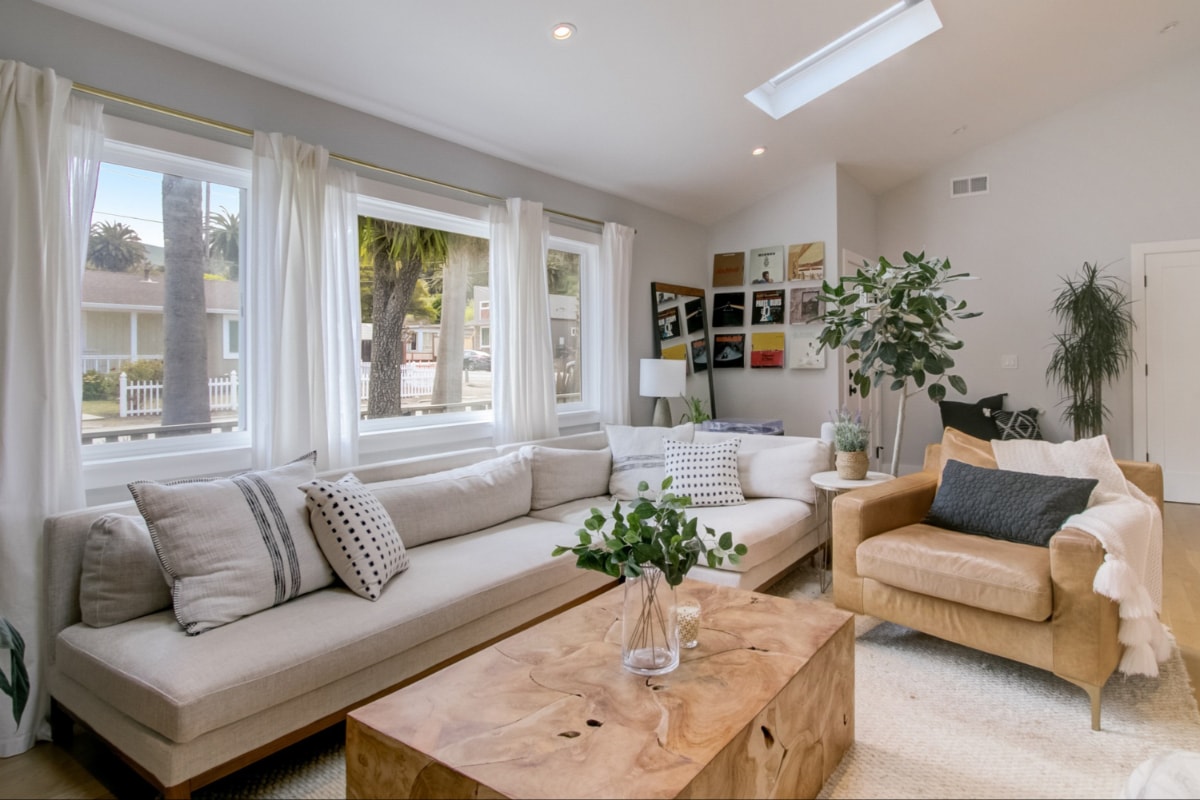
19. Choose artwork with unconventional materials
Art pieces made with unconventional materials, such as metal, wire, or recycled materials, can bring unique and unexpected textures to an apartment. These unconventional materials can create a one-of-a-kind focal point that showcases the artist’s creativity and personal style, making the apartment feel more unique and personalized.
“Artwork that uses unconventional materials creates a visual feast for the eyes and brings a refreshing and unique perspective that pulls people closer in to see what it is made out of,” says Paola Gracey.
20. Add texture through Italian accent pieces
If you’re looking to bring some Italian inspiration into your apartment, consider Italian accent pieces. Italian accent pieces, such as terra cotta pots, hand-carved wooden bowls, and wrought iron candle holders, can bring texture to an apartment by adding a touch of old-world charm and rustic warmth.
Italian Pottery Outlet says, “Transform your living space with colorful hand-painted ceramics from Italy. Platters or vases decorated with Tuscan scenes, Sicilian folk art, or geometric patterns will create a dramatic effect in any living or dining room. Add splashes of color to your kitchen by including a biscotti jar, butter dish, or utensil holder, or upgrade your balcony or outdoor area by introducing a volcanic stone table from Sicily or a beautiful hand-decorated urn or garden planter from Umbria.”
21. Play around with different color tones
Different color tones can evoke feelings of warmth or coolness, softness or hardness, and by incorporating a variety of color tones throughout the apartment, such as muted pastels or bold jewel tones, you can bring an unexpected touch of texture into your apartment.
“Adding texture to an interior can hugely affect the look and feel of a space,’ remarks Matthew Jones Ceramics. “Warm tones and rough surfaces help give a more rustic look and feel, while vibrant, bright, glossy surfaces and colors make a space more modern and sleek. Both styles can easily be achieved or enhanced by a complimentary piece of ceramic or textile. As a ceramic artist, I play with both by combining and contrasting bright-colored glossy glazes with earthy iron-rich clay bodies.”
22. Add original art you’ve collected
“Original art and craft has a wonderful texture and a story and includes everything from pottery, glasswork, photography, and paintings by professional artists, as well as your grandma’s jean quilt, childhood finger painting, and a handmade holiday card or ornament. If you’re not ready for original artwork, your favorite artist might have reproductions available,” shares Jessie Rasche. “Your art will all look beautiful together if it is displayed thoughtfully: hang everything that goes on the wall at the same height and keep the wall space around the art consistent. Add sculptures, glasswork, or healthy plants in unique pots placed on a table or shelf-top close to the art on the wall, and your space will have depth, texture, beauty, and personality.”
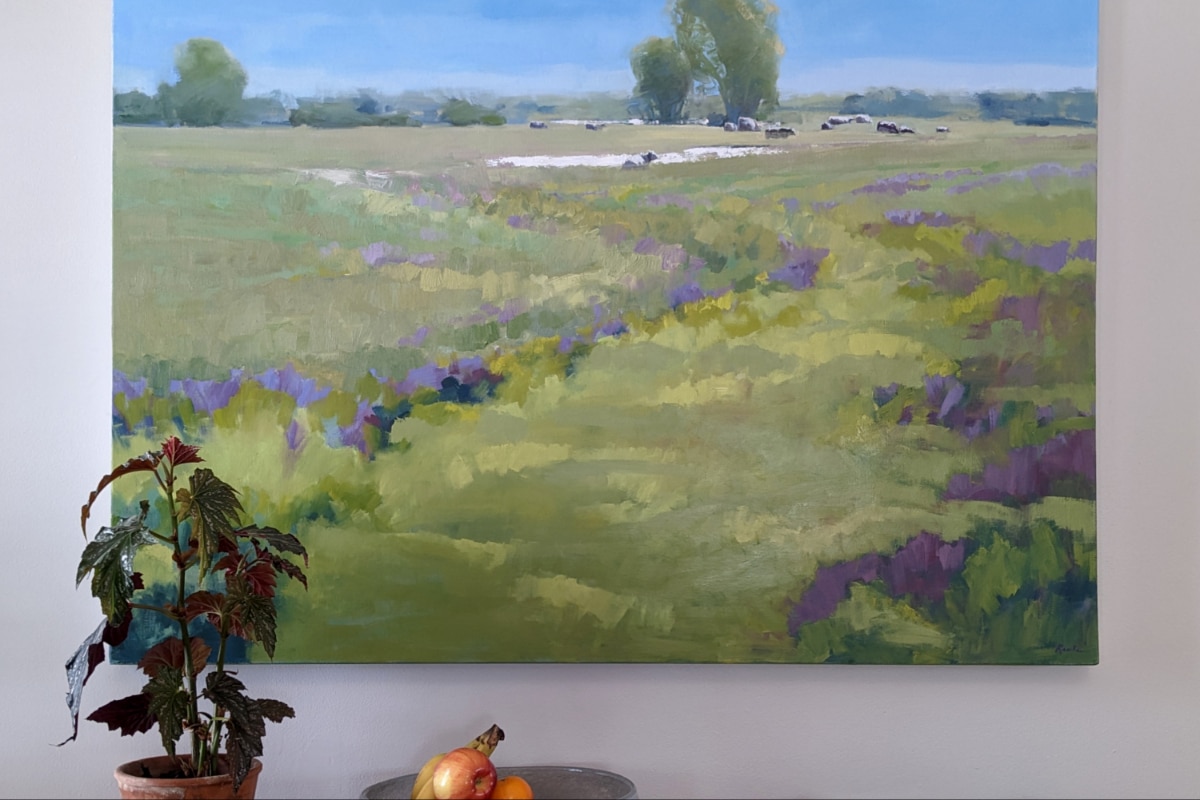
Photo courtesy of Jessie Rasche
[ad_2]
Source_link


